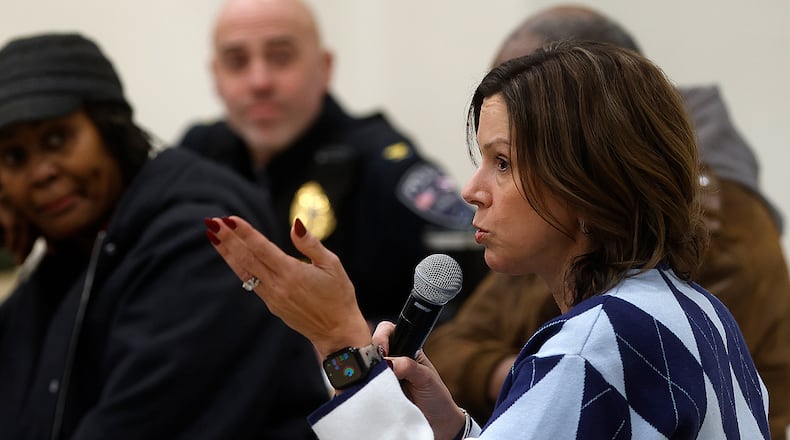The question of whether these measures undermine voters isn’t exactly cut and dried.
Dexter Ridgway, research associate of the Drug Enforcement and Policy Center of the Moritz College of Law at Ohio State University, said it’s difficult to know what people were voting for when they approved Issue 2.
“Are they voting for retailers or to legally consume and possess it?” he said.
In the Dayton region there are more than a dozen dispensaries licensed to sell recreational cannabis.
Under state law, customers 21 and older can buy up to 2.5 ounces of recreational cannabis at licensed dispensaries or home-grow up to six plants per person, with a maximum of 12 plants for a two-adult household for personal use. Any bans or moratoriums do not affect the ability of those of legal age to possess and use recreational cannabis, by smoking, vaping or edibles, or to grow the plants.
Issue 2 also included language specifying that cities, villages and townships are allowed to pass laws prohibiting or restricting adult-use cannabis businesses, which Ridgway said could have been a factor for some voters.
More and more communities in the Miami Valley are setting temporary and permanent bans, though this is bucking the trend in the rest of the state. Only 5% of Ohio’s population is under an opt-out, Ridgway said.
Comparatively, 73% of municipalities in Michigan have opted out and 50% in New York have opted out in some way, whether it be medical only or a ban on medical and recreational, he said.
As of Feb. 4, 118 municipalities in Ohio have either permanently or temporarily banned the commercial cultivation, processing and dispensing of adult-use recreational cannabis, according to data from the Moritz College of Law. There had been 128 on the list, but 10 have since dropped a moratorium, Ridgway said.
However, that doesn’t necessarily mean those communities will be future sites of recreational-use marijuana businesses.
“Some are allowing it but have a restrictive zoning code to the point where it is in effect a ban,” he said.
Last month, the city of Kettering made its temporary freeze on adult-use recreational cannabis businesses permanent.
“We did not feel that the best use of our very limited land and real estate in the city was a dispensary,” said Mayor Peggy Lehner, who noted there are dispensaries an easy drive away in Beavercreek and Dayton.
Riverside has two dispensaries operating in the city, but extended a moratorium through August. The moratorium affects 17 different types of businesses, such as self-storage facilities, gas stations and extended stay hotels.
“The extension really is because we are going through a new zoning code update and that will be closer to third or fourth quarter in 2025,” said Katie Lewallen, Riverside’s communications manager and clerk of council.
The city of Dayton has never had a moratorium on licensed cannabis businesses and has only restricted them based on appropriate zoning districts and building code regulations, the same as any other type of business, said Keith Klein, senior economic development specialist.
“From a development perspective, licensed marijuana businesses have been an economic success story. They have invested millions of dollars in revitalizing underutilized buildings and created approximately 250 new jobs in Dayton alone,” he said.
The businesses also generate new tax revenue. Issue 2 included a 10% excise tax, which is in addition to local sales taxes. Of that excise tax, 36% goes to the municipalities and townships with an adult-use dispensary. Money collected also goes toward a social equity fund and substance abuse and addiction fund.
“Generally speaking, these businesses are safe and responsible neighbors in the community, in part because they are so heavily regulated by the state of Ohio,” Klein said.
The city of Fairborn’s moratorium expires March 31. City leaders invited residents to share their thoughts and ask questions during a Jan. 28 community forum at Fairborn High School.
“The bottom line is, is this something we want in Fairborn?” Mayor Dan Kirkpatrick said to the crowd of a few dozen residents, business owners and other community stakeholders.
Credit: Marshall Gorby
Credit: Marshall Gorby
City leaders said a dispensary could generate $400,000 in tax revenue.
Many in the audience had questions, such as whether it is legal to smoke marijuana in public, or in a designated outdoor drinking area during the warmer weather. Fairborn Police Chief Ben Roman said neither is allowed and that laws commonly applied to those abusing alcohol in public would apply to violators.
Roman also educated attendees on the state-imposed restrictions on where such businesses can be situated, which keeps them a certain distance from schools, child care centers, parks, public libraries and places of worship.
Credit: Marshall Gorby
Credit: Marshall Gorby
Mike Uecker of Bath Twp., a retired Air Force veteran and former Fairborn school board member, said “a medical-use facility would be all right” but that he is opposed to a recreational marijuana retailer.
Uecker said he has reservations about whether such an enterprise would be detrimental to existing businesses with military contracts requiring high-security clearances and the “opportunity cost” if cannabis retailers would make the city unattractive to military contract businesses that offer good, high-paying jobs.
“What do we risk?” he said.
Fairborn resident Beth Renken said she supports having an adult-use cannabis business with knowledgeable employees rather than people buying unregulated marijuana products.
“I rather it be in a controlled environment,” she said.
The state is expected to start allocating additional licenses this summer, but it is not known how many will be released, Ridgway said.
Other unknowns include changes proposed in the Ohio General Assembly — including one sponsored by state Sen. Steve Huffman, R-Tipp City — that call for increasing the excise tax, possibly removing the share provided to local communities, capping the number of home-grow plants to six for each household and limiting the number of dispensaries.
Opponents say the tax incentive was a large part of why municipalities and townships allowed cannabis businesses. Also, they say the higher cost that would be passed on to consumers could drive many adult-use customers to states like Michigan with lower tax rates or to the illicit market.
Credit: Marshall Gorby
Credit: Marshall Gorby
| Area communities have banned the sale of recreation marijuana | ||
|---|---|---|
| City | Complete | Other decision |
| Beavercreek | No | Ban on new businesses |
| Bellbrook | No | Moratorium through 5/20/25 |
| Carlisle | No | Moratorium through 5/21/26 |
| Centerville | No | Moratorium through 5/9/25 |
| Clayton | No | Moratorium through 9/5/25 |
| Clearcreek Twp. | Yes | |
| Dayton | No | |
| Englewood | No | Limit of one dispensary |
| Fairborn | No | Moratorium through 3/31/25 |
| Fairfield | No | Limit of one dispensary |
| Franklin | Yes | |
| Hamilton | Yes | |
| Huber Heights | Yes | |
| Kettering | Yes | |
| Miami Twp. | Yes | |
| Miamisburg | Yes | |
| Middletown | No | Limit of three dispensaries |
| Monroe | No | Restrictions on where they can be located |
| Moraine | Yes | |
| Oakwood | Yes | |
| Oxford | No | Limit of two dispensaries |
| Riverside | No | Moratorium through 8/21/25 for new businesses |
| Springboro | Yes | |
| Springfield | No | |
| Tipp City | No | Moratorium through 12/15/25 |
| Trotwood | No | Moratorium through 12/31/25 |
| Troy | Yes | |
| Vandalia | Yes | |
| Washington Twp. | No | Moratorium through 5/13/25 |
| West Chester Twp. | No | Moratorium through 6/30/25 |
| Xenia | Yes |
Staff writers Sydney Dawes and Cornelius Frolik contributed to this report.
About the Author




